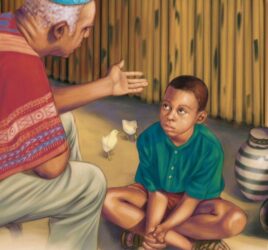Global Invitations to the Table
When I was a student at the Canadian Theological Seminary in the early 1980’s, my missiology professor talked about CDC or Closed Door Countries and CAN or Creative Access Nations. Thirty years later, we [now] talk about globalization, rapid mobility, mass migration/diasporas, labor/economic re-alignments, and communication connectedness. Three decades ago we debated how to penetrate these so-called CANs and CDCs. The answers then were “Bible-smuggling” and undercover “tentmaking.” Since then the validity of these strategies have been challenged by ethicists. Then, missiologist, Ralph Winter, coined the term Unreached People Group (UPG), now missions strategists such as Finishing the Tasks’ Paul Eshleman, talk about Unengaged, Unreached People Groups (UUPG). Then, we planned for the “Regions Beyond”. Now, in some circles, we strategize for the “Regions Around” us.
Today, observers see the world around us in “Megacities” — no longer Global Villages, but rather more like “global condominiums” or “global apartment”. We also hear about how “global networks” have been replaced by “global families”! My point is: missions and evangelism departments must update their syllabi to keep up with current realities. Our emerging leaders need to recognize the realities of the 21st Century World. Missions professors must spend hours looking at the syllabi for Economic, Labor, Sociology, Migration, and Technology courses. I would suggest that we need more integrated and interdisciplinary missions courses in order to meet the challenges and opportunities presented by these new realities.
In this age, I don’t think that it is too complicated to conceive the potential impact of simple, but intentional personal relationships that spread across the globe. Allow me to give you an example.
Three weeks ago I was in Bahrain, a small but strategic island in the Arabian Gulf. There were gathered 90 Filipino Kingdom Workers from the largest country in the region, representing a myriad of professions: medical doctors, nurses, engineers, bus drivers, maids, etc. Some have been in the region as Overseas Filipino Workers (OFWs) for 35 years, indicating long-standing relationships with Arab employers. In short, many of these Filipino Kingdom Workers have earned credibility, the respect, and even love of their masters.
In the three days, we met to seek the face of God. We worshiped and prayed together, and acquired knowledge and skills on how to effectively connect with our co-workers in the hospitals, hotels, oil fields, etc. Call this “witnessing”! The trainers and resource speakers were:
H.A. is a seasoned Arab trainer and evangelist. Roberto is an “adopted” Filipino living in the Philippines with the Southern Baptists. Mark is a Filipino businessman who travels extensively as an expert on team building. It was my privilege to learn from these servant-leaders.
During our gathering, participants learned how to confidently share their “life-changing” stories, and I believe, they left and returned home to their adopted nation excited and empowered. At the end of our time together we had a big Arabian dinner followed by “the breaking of bread.” I told my friends that Jesus nor his followers built a memorial or monument at Calvary or Bethlehem for him to be remembered. I explained that Jesus’ memorial, or His Table, is mobile. His table must be spread to all nations and countries of the world. So at the end of our time together, we recommitted among ourselves to share our stories to our local friends so that many of them would join in and around the Master’s Table for the “breaking of bread.”
Meet some of my friends who were also there.
Jopet, the chairman of the Filipino International Network in the region, is based in Kuwait. He has been a medical technologist for over 20 years in Kuwait City. He is excited to share his stories in the hospital every day.
Ronald lives in Bahrain with his wife and children. His job is to train aviation engineers in the region. His students come from the entire region to gain knowledge and skills to maintain the Airbus320. According to him, he gives Bibles as gifts to his students. “I don’t smuggle, but I give gifts and my students receive with gladness” Ronald insisted!
Ronnie is a successful Filipino civil engineer in the United Arab Emirates. When he is not working, he moves around the region, organizing trainings for Filipino Kingdom Workers; inspiring them to understand that God has a Higher Purpose for their scattering, beyond earning money in a foreign country.
Ike is a tenderhearted Filipino mining engineer in Oman, but he is also the pastor of a Filipino congregation whose members are lonely, discouraged, and burdened. Foreign workers also need godly and gentle under-shepherds of God’s flock.
Before I forget, let me tell you about Luis. Luis has been working for 25 years as the baker of a Royal family in Bahrain (see his story on Lausanne’s Global Conversation at http://conversation.lausanne.org/en/resources/detail/11110#.UpQEJpEhVjR). Whenever he hears that I am in town, he brings me packages of Arabian dates and loaves of banana bread that he baked at the palace. This time I couldn’t take these pastries home, so I gave some to Jopet, Ike, and to Thomas — the worker from India who cleaned my hotel room for several days. Ah, Luis’ generosity has extended and multiplied!
The Filipino Kingdom Workers who met in Bahrain for this gathering are all associated with the Filipino International Network (FIN). FIN is a catalytic movement of Christians committed to motivate and mobilize Filipinos globally to partner for worldwide mission. These Filipinos are like the Trojan Horse — the massive monument that contained the Greek heroes who won the Trojan War.
Consider these statistics:
Kingdom of Saudi Arabia — Number of Filipinos: 1,550,572 United Arab Emirates — Number of Filipinos: 679,819 Qatar Number of Filipinos: 342,442 Kuwait Number of Filipinos: 186,750
(Source: Country Migration Report Philippines 2013, International Organization for Migration, p. 55).
Now imagine that approximately 7% of the OFWs are evangelical Christians (Philippine Council of Evangelical Churches). Imagine if close to 7% of Christ’s Filipino followers in the Gulf region, were mobilized as Kingdom Workers or “story-tellers” whose lives declare testimony to “God [who] so loved the world that he gave his one and only Son, [and] that whoever believes in him shall not perish but have eternal life” (John 3:16). Imagine if each one of them invited just one other person to become a regular partaker of the Lord’s Table before they returned to their homeland, the Philippines?
Think about the future banquet in heaven (Revelation 19:9), and remember the people who invited you to the Table.
Is that too complicated to imagine?
————————————————————————————–
Sadiri Joy Tira (D.Min., D.Miss.) is the LCWE Senior Associate for Diasporas; Vice President for Diaspora Missions at Advancing Indigenous Missions (AIM); and Diaspora Missiology Specialist at the Jaffray Centre for Global Initiatives at Ambrose University College (Canada). With thanks to the Billy Graham Centre
Author: Joy Tira



